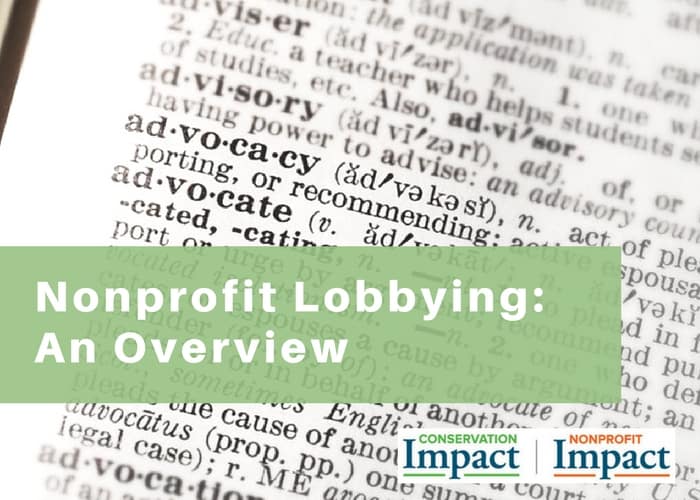
Yes, Nonprofits Can Lobby
501(c)(3) nonprofit organizations can lobby. Seriously, we checked. Actually, we knew that already.
But many people who work or volunteer for nonprofits believe that lobbying is prohibited. Lobbying and advocacy aren’t the right strategies for every nonprofit – but they are powerful ones. So, if your organization has avoided them in the past because it believed the, “it’s illegal for nonprofits to lobby,” myth, it might be time to reconsider.
Ch-ch-ch-changes
Ever since the 2016 election, there’s been a huge upsurge in people contacting their elected representatives, donating to certain causes, and in general looking for ways to get involved in issues they care about. Even if these trends aren’t affecting your organization directly, they are changing the way individuals view and engage with nonprofits. Expectations are changing and this holds a lot of implications for mission-driven organizations of all types.
We’ll be writing more about some of these implications over the coming months – what does it all mean for volunteer management, for fundraising, for measuring impact – things like that. But let’s start with a quick review of lobbying and the nonprofit sector.
1. Lobbying ≠ Advocacy
The IRS calls lobbying, “…attempting to influence legislation.”
“An organization will be regarded as attempting to influence legislation if it contacts, or urges the public to contact, members or employees of a legislative body for the purpose of proposing, supporting, or opposing legislation, or if the organization advocates the adoption or rejection of legislation.”
IRS.GOV
That’s a pretty limited definition. Advocacy includes lobbying, but it also includes a much larger and varied set of activities, such as:
- Educating policymakers and the public about broad social issues
- Encouraging people to register to vote
- Organizing communities
- Educating voters about candidate positions
- Litigating
- And many other activities
With the exception of lobbying and partisan political activities, all of the forms of advocacy listed above are unrestricted and unlimited for 501(c)(3) public charities.
2. 501c3 Nonprofit Organizations Can Lobby
Here’s what you can’t do:
“Charities are expressly prohibited from intervening in a political campaign of any candidate for public office, and from engaging in partisan activity of any kind. In addition, charities may not use government funds, such as government grants or contracts, to lobby, including the use of federal funds to lobby for federal grants or contracts.”
New Jersey Center for Nonprofits
That’s it. Those are the only things that are prohibited.
And here’s what you can do:
- Direct lobbying (i.e., communicating with policymakers, elected officials, and/or their staff to express support or opposition to specific legislation)
- Grassroots lobbying (i.e., communicating with your constituents or the general public to express support or opposition to specific legislation AND making a call to action)
3. There are Limits
In general, no organization may qualify for section 501(c)(3) status if a substantial part of its activities is attempting to influence legislation (i.e., lobbying).That’s the IRS’ way of saying it’s okay to lobby as long as that lobbying does not constitute a substantial part of a nonprofit’s activities.
So, what’s ‘substantial?’
There are a couple of ways the IRS measures this, the ‘expenditure test’ being the most clear-cut. The expenditure test sets a financial maximum to the amount you can spend on lobbying during a tax year up to a maximum of $1,000,000, depending upon the size of the organization.
Ready to Learn More?
Here are some great resources if your organization is ready to get involved in lobbying, or advocacy, or both!
- American Bar Association’s Overview of Nonprofits and Lobbying
- Pennsylvania Land Trust Association’s Conservation Tools: Lobbying and 501(c)(3) Organizations
- National Council of Nonprofits’ Everyday Advocacy Page (check out the advocacy tool kits under the resources link)
- National Council on Aging’s Advocacy Basics (more details on the difference between lobbying and advocacy)
Image by KDH0521

